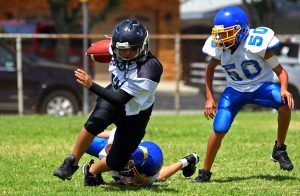Understanding Concussion Warning Signs in Kids
Although many parents worry about the dangers of concussion, playing contact sports at a younger age can help children play safer when they get older, says Joelle Rehberg, DO, an osteopathic physician who practices sports medicine and concussion management in Morristown, New Jersey.
“With contact sports, it’s better to learn the fundamentals like tackling, heading a ball and falling properly at the slower rate of middle school sports than when the game pace is much faster and the hitting force is harder in high school or college,” says Dr. Rehberg, a football mom.
Focusing on preventive care, Doctors of Osteopathic Medicine, or DOs, look beyond your symptoms to consider how environmental and lifestyle factors impact your health. They are trained to listen and partner with you to help you not only get healthy, but stay well. Find an osteopathic physician near you.
How can I tell if my child has a concussion?
A concussion is a type of traumatic brain injury caused by a blow to the head or any force from a blow to the chest, neck, back or face that radiates to the head. Children and teens are especially susceptible to concussion-related injuries because their brains and bodies are not as developed as adults.
Symptoms can include:
- Pain in the area of head injury.
- Dizziness.
- Nausea or vomiting.
- Confusion or inability to focus.
Since younger kids might not understand the symptoms they are experiencing, parents should be aware of the signs of concussion and ask questions using language the child will understand, says R. Robert Franks, DO, an osteopathic physician and medical director of the Rothman Concussion Institute and Jefferson Comprehensive Concussion Center in Philadelphia.
What are some ways to prevent a concussion?
You can help avoid head injuries by making sure your child wears a helmet or other protective gear when playing sports, riding a bicycle or doing other strenuous activities. Be sure the protective equipment fits properly and is well-maintained.
You should also become familiar with your child’s school or sports league concussion policy. If they don’t have one, encourage the school/school district or league to create one.
My son wants to play soccer instead of football. Do we need to worry about concussion prevention?
Any contact or collision sport brings a certain amount of risk, says Dr. Franks.
“Football isn’t the only sport that presents risk for concussion. Athletes in sports such as soccer, field hockey and cheerleading could also be at risk,” Dr. Franks says.
My daughter hit her head during a soccer game and has a headache. Should I be worried?
Not necessarily. Other conditions, such as dehydration or low blood sugar, can sometimes mimic symptoms of a concussion. However, it’s a good idea to have the child evaluated, Dr. Franks says.
“Not every injury will lead to concussion. If the child’s behavior deviates from his or her norm, it’s a good indicator that something could be wrong,” Dr. Rehberg adds.
Raising awareness
The American Osteopathic Association has developed a comprehensive, evidence-based policy detailing how coaches, athletic trainers, school nurses, physicians and parents can work together to care for potentially concussed young athletes. Recommendations include the following:
- Immediately stop your child from practicing or playing if there’s a chance your child might have a head injury.
- Partner with your child’s physician to develop a treatment plan that includes determining when your child can return to the field and working with school officials to create a “return to learn” protocol allowing for cognitive rest until your child’s symptoms decrease.
- At the start of the athletic season, ask your physician to conduct baseline testing that evaluates your child’s balance and cognitive function. These tests can help determine the level of impairment if your child later sustains a concussion.
